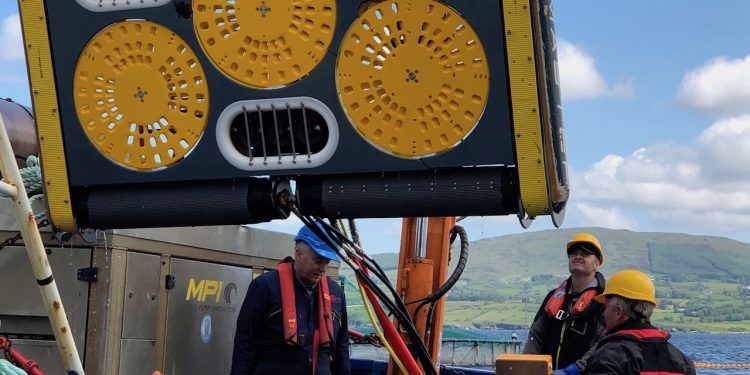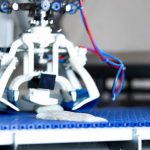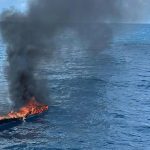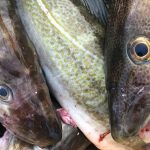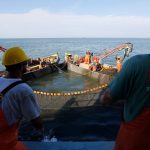In Ireland MOWI has continued in the development project that began in 1979 in Fanad Fisheries in Donegal and has now expanded to include additional sites in Donegal (Lough Swilly, Mulroy Bay and Inver) as well as other full production sites in counties Mayo, Cork and Kerry – all of which operate within the remit of the regulation of organically produced salmon.
The term ‘organic’ does not simply mean that the feed must come from an organic source, but the strict criteria that govern a salmon producer includes fewer fish per cage, monitored feeding patterns and naturally, cage cleanliness.
With over one million fish produced from the combined harvest of these Irish sites, the MOWI Ireland business is a major operation that requires careful management – not just in terms of maximising production of high quality fish (within the volume limits of its licence) but equally in terms of hygiene, husbandry, animal welfare and, most importantly, maintaining the highest standards of environmental friendliness.
It is in the vitally important area of cage cleanliness that MOWI in Ireland have opted for leading technology provided by Norwegian firm MPI (Multi Pump Innovation) and their groundbreaking Racemaster, a remotely-controlled robot with pressurised water jets powered by a Volvo D500 engine under a canopy combined with a Hughes pump, to ensure that all marine growth is removed.

Capable of cleaning an entire cage in just over one hour, this equipment requires just one operator sitting in front of a monitor and guiding the cleaning head on its course as it travels along the sides and bottom of the cage.
With its HQ near Oslo in Norway, the relatively young MPI company has evolved in the heartland of the aquaculture sector and has witnessed the rapid growth in this industry over the past two decades.
This meant that the company were ideally placed to develop and research a product that could remove the highly labour intensive, and very costly, chore of manually hauling nets to wash them on shore – and so, the first generation ‘RONC’ was born – a somewhat primitive but perfectly functioning automated cleaning system that fish farmers welcomed with open arms.
‘We used the RONC for over four years before moving up to MPI’s Racemaster for the past two seasons,’ explained MOWI’s Scraggy Bay (Lough Swilly) site manager Kevin Friel, adding that the Racemaster has ‘ironed out’ any glitches that the RONC might have had.
‘You can certainly see the difference with the nets – one sweep of the Racemaster and all marine growth is completely removed and this cleaning is so important for us because (a) the obvious factor of keeping growth away and ensuring good filtration of fresh oxygenated water and (b) if growth is allowed develop on the cages then our ‘cleaner fish’ (lumpfish sourced from a nursery in Wales) cease to do their job of eating lice off the salmon and instead focus on feeding on the marine growth,’ he said.
User friendly
The Racemaster requires just one operator in front of a single screen but in the case of MOWI’s system, where they are constantly going from cage to cage day after day, they alternate between two operators for each cage and this, explained senior operator Declan McAteer, is to ensure that full attention is paid to the job in hand.
‘The Racemaster does a great job but as in any such technology, its only as good as the man behind it – focusing intensely on a screen for over an hour is mentally tiring – no matter what job you are doing – so myself and the other operator, Declan Duffy, take turns after each cage to ensure there’s a fresh set of eyes in control,’ he said.
‘We did experience some minor operational issues in the early days of the RONC system but that’s to be expected with relatively new technology and the first generation of equipment – but nowadays, since getting the Racemaster system, this really does an excellent job,’ he added.
‘MPI take customer service seriously and, in trying to look after their customers, they regularly offer or suggest new types of belts and studs for the cleaning head – and we’re very pleased with the package/system we currently have,’ he said, adding that some of their site cages have been cleaned regularly with the Racemaster for the past year and, with sending divers down to check the cages after every cleaning session, the reports are always excellent – clean meshes with no wear or tear.
The hub for all of MOWI’s Irish operations is its Fanad-based HQ where a processing factory with over 100 staff handles the production that comes for its nationwide sites.

The man with the massive task of co-ordinating all of this is MOWI’s Northwest Marine Operations Manager Liam Doherty who, unsurprisingly, is a strong advocate of the importance of keeping the site cages clean at all times.
‘The biggest challenge for today’s fish farmer constant marine growth and ensuring that this is kept to a minimum at all times as uncontrolled growth not only stifles fresh water current but can also result in brittle pieces of growth being inhaled by the fish and causing minor gill bleeds with can then potentially result in disease,’ he said.
‘The aquaculture industry involves massive investment – from equipment, producing/purchasing smolt, staff and ongoing careful farm management – and to see a return on that investment the best methods of operation must be employed. We have yet to see any product that can clean our cages as efficiently as MPI’s Racemaster does,’ he commented, adding that this technology has performed so well that it has prompted MOWI to invest in another complete cleaning head and full power pack for its Castletownbere, Co. Cork sites.
‘Another major benefit for us with this system is that we can now have it permanently on board our own vessel Johnny M which has become a dedicated ‘cleaning vessel’ which we can not only move cage to cage, but from site to site, for example from Scraggy Bay in Lough Swilly to Mulroy Bay and Fanad.’
According to Liam Doherty, it’s natural that with the high level of R&D that has gone into the production and manufacture of the Racemaster, that its ‘an expensive bit of kit’ but he’s quick to point out that in any field, top technology always comes at a price.
‘MPI’s recognition of the need of cost effectiveness for fish farm operators resulted in their introduction of a purchase/leasing agreement which means that having the latest technology in cage cleaning is now possible for all fish farmers,’ he said, adding that the next step in the evolution of this system should be to include a vacuum system that will draw in the debris as it is cleaned off the nets by the water jets.
‘I’m sure that will come in time,’ he concluded.

